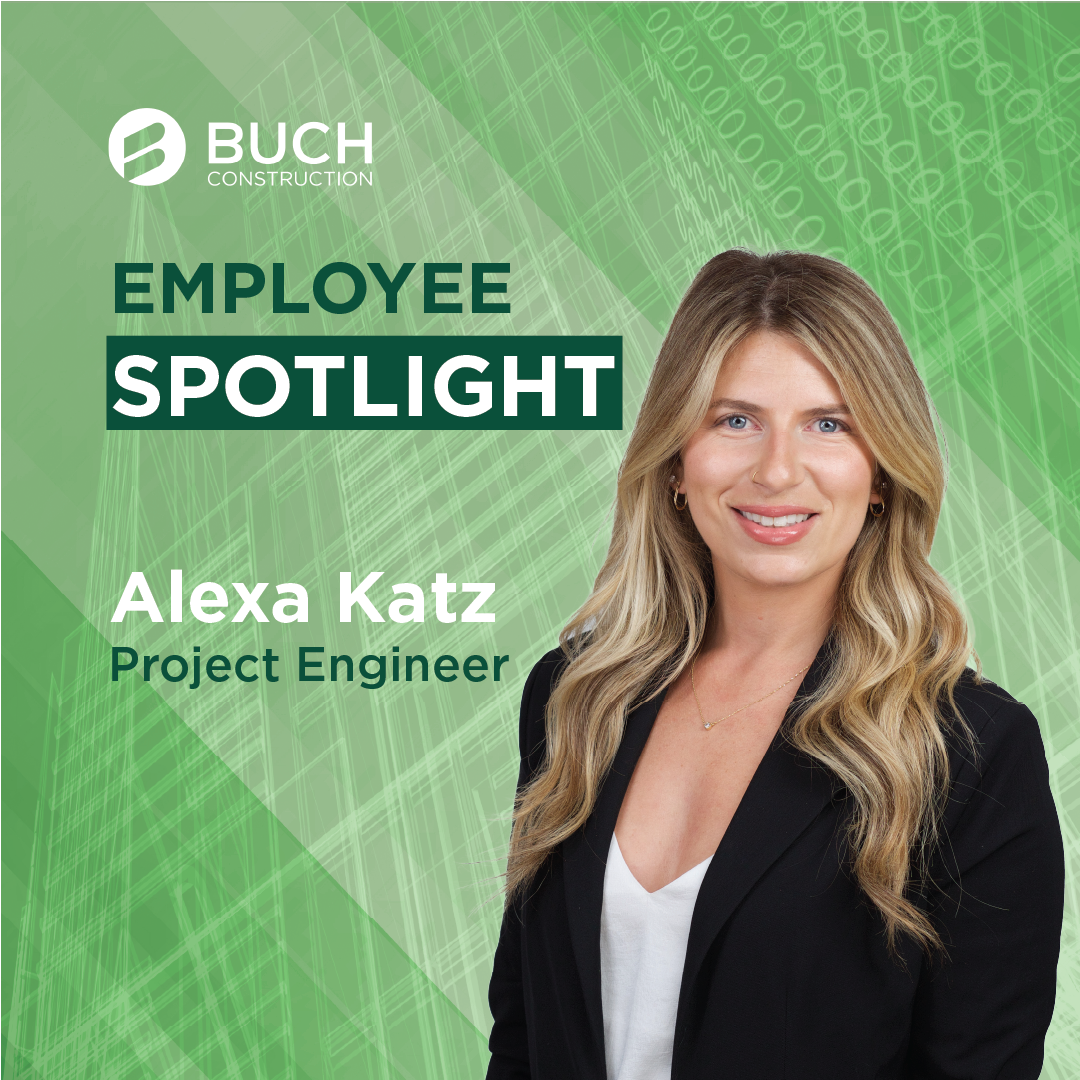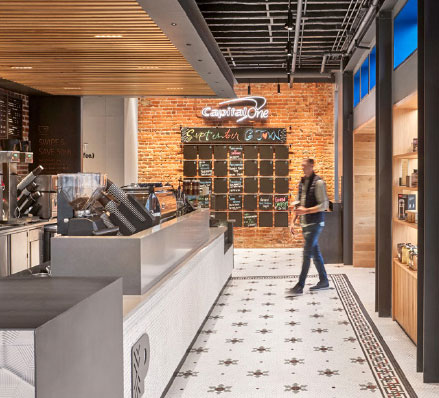Employee Spotlight Alexa Katz

ALEXA KATZ · Project Engineer
What do you enjoy most about working on a project?
I enjoy seeing a two-dimensional black and white drawing come to life. It’s amazing to see a concept become something tangible, knowing that you helped get it to that point. it’s been exciting to create string relationships with our subcontractors and clients to build a finished product. Over the duration of the project, we’re able to transfer all the online communication to something physical and watch the progression in real time. Being able to meet with our subcontractors and clients on the job site has been extremely beneficial in furthering my understanding of both the construction and project management sides of our jobs. Getting increasingly more exposure has continued to help me grow in this field and maintain strong relationships with everyone that is working on our projects.
What are your main professional goals in the coming years?
Professionally I aspire to become a project manager in the Northeast region in the upcoming years. I’ve been lucky enough to work with multiple project managers at Buch as they take on various projects with a wide range of scopes. I’ve been able to absorb all the positive attributes they bring to their own projects in hopes of being able to follow their lead. Each PM on our team has their own specialties and strengths that shine throughout their project duration; and I hope to move forward in this career with the same.
What does ‘Beyond What’s Expected’ mean to you?
‘Beyond What’s Expected’ to me means surpassing the ordinary standards or requirements in any given situation. It’s about pushing boundaries and delivering results that exceed initial expectations. Essentially, it’s about setting a higher bar for oneself and striving to consistently top it, regardless of various limitations. As a company, it’s crucial to lay a strong foundation, then welcome its employees to contribute new ideas and skills to reach their goals. With this mindset, opens greater opportunities.
What do you like most about working at Buch?
Working at Buch is like working with a family. There is no pressure to be perfect and there is always open ear to listen. While some colleagues may be working on a different project, they are always available and willing to help with yours. Everyone has their own strengths, and when those are shared, they make our company stronger. It’s great to work in a close-knit work environment; one that gets you involved in all aspects of the project and pushes you to be better every day.
What is it like working in a field that’s predominantly male? How is it changing and what has transformed the change?
I think people are still getting used to the fact that women enjoy working in the construction field whether it be architecture, engineering, project management, or even physical labor. I’ve received plenty of calls and emails with the assumption that I’m male, and they call me “Alex” instead of “Alexa”. They are used to women having an assistant position, rather than contributing to the work itself. But I see all of that slowly changing, and I am thankful to work in an environment that welcomes diversity and makes me feel comfortable coming to work every day. I believe diversity in all forms is being recognized and appreciated more in this business, allowing us to bring new perspectives and insight to an industry that may have previously been set in its ways. The gradual increase in exposure to advanced technology and school programs like Women in STEM has certainly encouraged young women to broaden their horizons to greater opportunities in these fields. For some women, they were taught that these interests were “too masculine”, and they had to choose a career path that was considered “feminine”, leading them to sacrifice a skill or hobby that brought them joy. I’m extremely proud to be part of a movement that didn’t exist until very recently, a movement that is opening doors for so many women. It makes me so excited when I see a woman walking around New York City with a construction hat dangling from her backpack, or some rolled up drawings under her arm. I know some day we won’t even be having this conversation anymore.
You previously worked in the healthcare industry and changed your career path, what propelled the change? What have you learned in your previous field and brought into this field?
When I was younger, I wanted to be either a cardiothoracic surgeon or an architect. But I was told the big money was in the medical field, so that’s what I chose. Science fields always fascinated me because there were right and wrong answers, but always room for new discoveries. I loved practicing in the field- being hands-on with patients and being part of the change that made a difference in people’s lives. I learned how to be proactive when people’s lives were literally on the line, I learned discipline and structure, I learned how to collaborate with my coworkers and superiors in high-stress situations, and I learned amazing communication skills while working with patients of various ages and backgrounds. Once COVID-19 hit the world shut down, and I had no idea what my future had in store. I was continuing schooling at that point, and I made the decision to shift gears; to take all the skills I had learned and used them toward something I could see myself making an enjoyable career out of, rather than the path I chose when I was in kindergarten. I spent my entire upbringing focused on following the medical path, but during grade school I would always come home to build K’NEX roller coasters or Robotix figures. I’d get out all the pieces, follow the instructions, and I wouldn’t look up for 6 hours until I was finished. My love for hands-on projects and disciplined training in healthcare pair perfectly for a career in construction project management. I was always taught to treat a patient the way I would treat a family member- with care and respect. Maintaining a caring, professional relationship with a client or a colleague can make or break the ability to secure a project in this industry, and understanding the proper way to treat people will get a person very far in their career. We work in a field of innovation and the need to problem solve and I’m excited to see it grow. Now I just have a little more time to solve these problems than I would have had in the emergency room
Buch has various offices across the East Coast, you are currently working in the New York City office. What is a day like working in New York City?
Working in New York City can certainly be exciting. Even though we work in a small office, there is a good chance that someone is always going to be onsite. If your project is in the city, it’s so easy to walk downstairs and jump on a subway that will likely get you close to the jobsite. Every neighborhood of the city is completely different, some more quiet than others. Our office is in such a central location in the city, it can get quite overwhelming if you’re not used to tourism and the constant movement surrounding you. It’s certainly never quiet, and there is something quite comforting about that. The constant taxi horns and sirens from the street are strangely soothing, and the view of the Empire State Building from my window can’t be beaten. There is always a new restaurant to try for lunch, and something fun to do after the workday is over.
Do you have any special hobbies or interests? Have you ever traveled to pursue them?
I am a huge sports person. I spend my winters traveling up the coast and across the country to snowboard with friends, and the rest of the year is spent playing competitive volleyball and softball. I also spend a lot of time going to concerts. If I could spend all my money on one hobby, it would probably be on live music. New York City is the absolute greatest place to see a show, but I’ve also traveled across the country for concerts and then made snowboard trips out of it.
What do you like to do for fun?
I love art of all kinds. I’ve done plenty of custom pieces for home decor and clothing, and I also do some surf photography along the local beaches when there’s a big swell coming through.
What is one thing you can’t live without?
I don’t think I could live without my 40oz. stainless steel water bottle. I’m not sure how I’ve managed to go most of my life without always carrying one around. I keep one at home, one at my desk, and one in my car.
